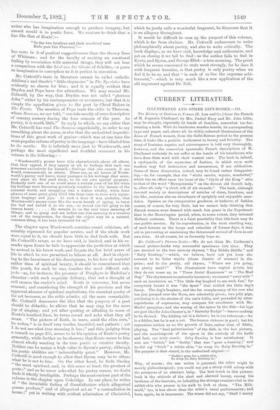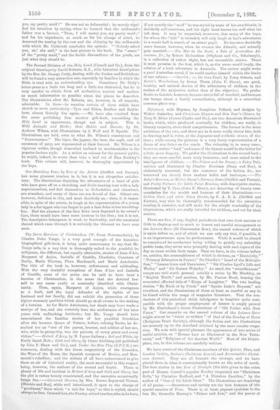Mr. Caldecoit's Picture Books.—We do not think Mr. Caldeoott'e annual
picture-books very successful specimens this time. They are devoted to the two nursery rhymes, " Hey Diddle Diddle " and
Baby Bunting,"—which, we believe, have not yet been dis- covered to be Solar myths (those Jesuits of science) in dis- guise ; and to the pretty, old rhyme, " Where are you going, my pretty maid F" The illustrations have capital points, but they do not come up to " Three Jovial Huntsmen" or " The Mad Dog." The rhymes are occasionally incorrect; we cannot "away with" such an innovation as, "The little dog laughed to see such fun," for everybody knows it was "the sport" that tickled the little dog's fancy. The dog's laughter, and the fat complacency of the cow who has just jumped over the Moon, are admirably given ; two jolly pigs, pettitoing it to the strains of the cat's fiddle, and pervaded by utter roguishness of expression, may compare for excellence with Mr. Marks' penguins ; and the wooing of the spoon by the dish—his legs are just like Sir John Chester's, in " Barnaby Rudge"—leaves nothing to be desired. The fiddling cat is a failure ; he is too vehement,—he is a fiddler, but he is not a oat. The human virtuoso is good ; but hie expression strikes us as the growth of flute, rather than of fiddle, playing. The "final pulverisation" of the dish, in the last picture, and the marching-out of the spoon in the custody of the knife and fork, are truly comic. Baby Punting is less satisfactory. It was not "father," but "daddy," that was "gone a-hunting ;" and he did net " fetch " a rabbit-skin, "to wrap the Baby Bunting in." His purpose is thus stated, in the undoubted original ,- " Daddy's gone for a rabbit-skin, To wrap hii, Baby Bunting in."
Why, of course; the one action is paternal, the other might be merely philanthropical ; you could not put a sharp child asleep with the prospects of an abstract baby. The best touch in this picture- book is the attitude of the alert and alarmed bunny, among his brethren of the burrows, on beholding the strange creature clad in the rabbit-skin who pauses in his walk to look at thorn. "The Milk- maid," too, is less clever than the artist's usual performances ; and here, again, he is inaccurate, The wooer did not say, " Shall I marry
you, my pretty maid ?" He was not so deferential ; he merely signi- fied his intention by saying, when he learned that the milkmaid's father was a farmer, "Then, I will marry you, my pretty maid ;" and for his impudence, as much as for Ilia change of mind, he deserved the tossing by the cow nod the chivying by the milkmaids with which Mr. Caldecott concludes the episode. "'Nobody asked you, sir,' she said," is the best picture in the book. The "sauce" of the "pretty maid," and the feeble discomfiture of the youth, are just what they should be.







































 Previous page
Previous page